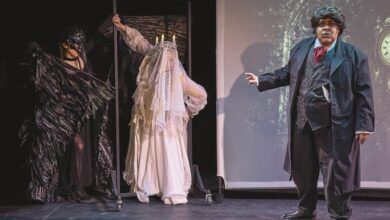Review: Stomach, Camden People’s Theatre
Camden Fringe
A gripping exploration of female plight and resilience, where tragedy lurks but hope flickers.summary
Rating
Excellent
We start at the end, or at least a possible ending, and a sense of foreboding fills the room as a result. Will this end in tragedy? Time then rewinds and we meet the three young women (referred to as ‘girl’ throughout) who are the focus of this 75-minute tale. Each actor speaks their truth, but the others duet the reality of the situation and express the character’s thoughts and feelings. This, in the early stages, creates moments of humour as ‘girl’ often argues with the chorus, producing an interesting way of showing a character struggling with her own inner voices. As the play progresses these exchanges become fast-paced and increasingly visceral, intense and completely compelling.
We discovered that one ‘girl’ played by Annabel Grey is at the beginning of an intense new relationship. However, the man she connects with isn’t all that she originally perceived. With the foresight of the ending, we grow to suspect that this is a destructive relationship. The second ‘girl’, played by Maya Loveday, is fighting with herself, in regard to her body image, as well as having a crush on a work colleague. Again, we can clearly see the roots of destructive behaviours reoccurring. The third ‘girl’, played by Vigs Otite discovers that she is pregnant. She now faces a decision; could this be a path that leads to a destructive end?
We follow these young women over the course of nine months as they journey towards the ending we were greeted with. Their stomachs churn with the decisions and choices they make, the challenges they face, and we know that at least one of them faces tragedy. What we see on stage are three stellar performances, full of deep emotion from believable and well-rounded characters. Grey, Loveday and Otite fully embody the girls’ plight but also play the supporting cast in each other’s stories, alongside playing the narrator/truth-tellers.
Stomach is an insightful and moving piece, written and directed by Ariana Xeno. The quick changes of focus, scene and situations are perfectly switched with the addition of a sound and lighting cue – allowing the actors to change position and persona. It’s effective, creating an intensity of pace and emotion, as we shift forward in time and jump between the storylines.
There are some moments of beautiful underscoring, from Bluegirl. Occasionally the sound drowns the performance, but this may have been intentional, to enhance the intensity of the scene and reflect the frustration the characters are experiencing; in some cases the music may be to drown out the trauma. Whether intentional or not, it moved me to the edge of my seat – I wanted to know what was going on, I was fully invested in the trajectory they were heading.
Stomach is a tour de force or acting and direction, a piece of theatre that reminds us of the plight that women face in our society. The issues raised are not new, it is sad they still need repeating, but the way they are portrayed is fresh and engaging, highlighting some bright new talent.
My stomach was in knots as their stories unfolded. Each woman being let down by the very people and systems that should have been a source of help. There is a twist in the tale but no spoilers here. I’m actually very glad that it was included, creating a glimmer of hope, a moment of female solidarity. Could tragedy be averted?
Written and Directed by: Ariana Xeno
Music and Sound Design by: Bluegirl
Produced by: Afriya Nylander
Stomach plays at Camden People’s Theatre until the 13th August as part of the Camden Fringe.
Further information and booking are available here.







